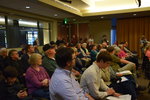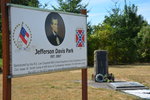

Rick Bannan
rick@thereflector.com
The Clark County Historic Preservation Commission had to change locations for their public hearing on whether or not to de-designate a monument dedicated to the Confederacy as the crowd it drew would have been too many people for their usual space.
By the end of the meeting Oct. 3 at Vancouver City Hall the commission had come to a consensus on the monument, located on what is officially known as Jefferson Davis Park, voting 6-0 in favor of dropping it from their list of historic sites. Councilor Roch Manley was absent.
The decision does not mean the monument is going anywhere anytime soon, as it resides on private property outside of city limits, off of Maple Grove Road south of Ridgefield. Commission Chair Robert Hinds brought this up at the start of the meeting — a protracted public hearing featuring dozens of individuals providing testimony.
Hinds also shot down a misconception he had seen at the commission’s September meeting, which was that the park receives any government grants or funding for its upkeep.
The decision to delist the monument comes after renewed interest in Confederate monuments across the country following the August deadly violence in Charlottesville, Virginia. In the fallout of the violence, the park near Ridgefield was vandalized, with Portland-based antifa taking the claim for the incident.
Chief among the determinants the commission needed to make was whether or not the monument fit the criteria for listing in the first place. How it came to be on that list itself had some holes, as its entry into the register was seemingly overlooked.
When the marker was initially nominated for registry in 2002, the commission at the time found it qualified in some of the needed criteria, though a motion by then-commissioner Holly Chamberlain which included a requirement for “the addition of a paragraph of biographical information on May Avery Wilkins (A Washington member of the United Daughters of the Confederacy whose efforts led the monument’s erection,)” as well as “That the nomination include, if it can be obtained, but specifically why it was originally placed farther up Main Street and also why it is placed where it is,” was made according to a Clark County Community Planning staff report.
“Current historic preservation staff has reviewed the entire file and have yet to find an amended nomination that reflects the request of the 2002 Historic Preservation Commission for the approval of the nomination to the Clark County Heritage Register,” the report states.
The park itself was not explicitly on the register, rather, it was a highway marker that initially sat in Vancouver, marking the southern terminus of Washington’s “Jefferson Davis Highway” — a term for Highway 99 that never saw wide use.
Now, the marker joins one placed in Blaine, initially, alongside flagpoles and a sign bearing the Confederate president’s face.
The monument in question was first placed in 1939 in Vancouver, before moving around and eventually winding up in city storage. When it moved to the Clark County Historical Museum a petition for its inclusion on the register was made, which was re-approved by the commission in 2007 when it moved to its current site.
Although several opponents talked about the racially-charged history of the Confederacy, others pointed out that Jefferson Davis himself doesn’t have any historic significance in Clark County. That was addressed by a few opponents of the delisting, who cited how in Davis’ time as U.S. Secretary of War he had surveyed the West Coast for locations for forts, in part starting the forerunner of the highway system in Washington.
Another route for significance was that it showed the efforts of the United Daughters of the Confederacy who were behind this and other highways named after the only president of the Confederacy. That avenue seemed to falter as through the testimony it was revealed there was never a United Daughters of the Confederacy chapter in the county.
Several opponents of the delisting were affiliated with the Sons of Confederate Veterans, who are in charge of the park’s upkeep. The hearing drew out Sons of Confederate Veterans Pacific Northwest Division Commander John Sigmon who gave an impassioned speech of resolve regardless of the voting outcome.
“We may lose … but this I promise you; the Sons of Confederate Veterans will never back up, will never quit, will never tire and will never surrender,” Sigmon said.
One Commissioner, Scott Denniston, was initially not in favor of the delisting, citing there was significant intrigue into the monument.
“I’d actually say that the presence of all these people here attests to its significance,” Denniston said.
However, in part through deliberation with the board and fellow Commissioner Alex Gall he changed his anticipated vote. Regardless of his mentality at the start of the meeting, Denniston did state the initial approval process was “profoundly flawed.”
“I think our (history of) not quite following our ordinance is what got us in this situation,” Denniston said. “We had a nomination that didn’t establish its significance, but we listed it anyway.”